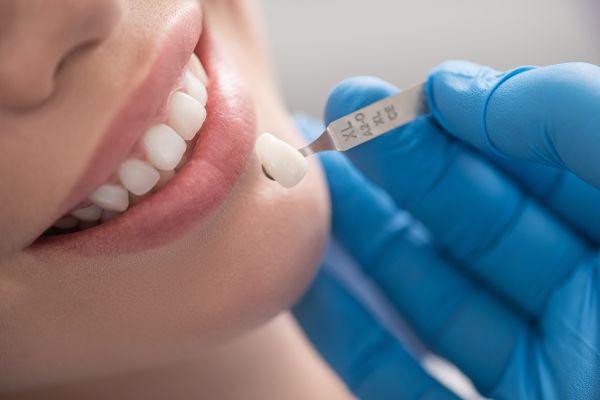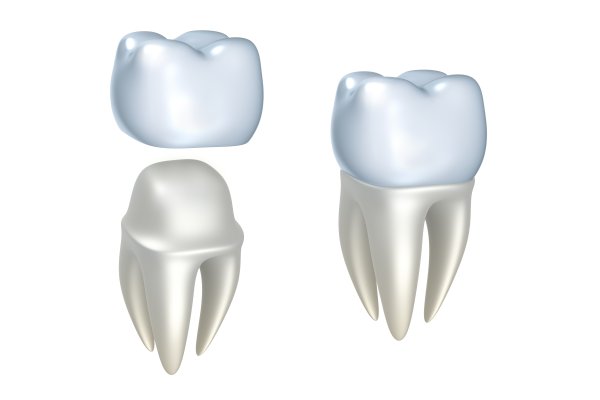The Different Types of Dental Veneers

Are you dreaming of a perfect smile but have chipped teeth, discolored teeth, significant gaps in between the teeth or another dental issue?
Improve your smile and confidence with veneers applied by a cosmetic dentist. Veneers can reshape and even out the teeth, fill in the gaps and give a beautiful, pearly white smile to show off. Not only do they enhance a smile, but they also protect teeth.
Five types of veneers
- Porcelain
- Composite
- Palatal
- Lumineers
- Non-permanent veneers
Porcelain veneers
Porcelain veneers, otherwise known as traditional veneers, started as a temporary solution to improve the smiles of actors in the late 1930s. These veneers are a thin ceramic shell bonded to the front side of the teeth. This method is a popular and permanent solution to undesired smiles. Porcelain veneers can last for at least ten years. With the right dentist and dental care maintenance, they can even last over 20 years.
Lumineers
Lumineers are the strongest and thinnest dental veneer; these veneers are about as thick as a contact lens. Applying Lumineers requires no grinding and is pain-free for the patient. It takes about two dentist visits to apply Lumineers. They will last for over 20 years and are completely reversible if desired.
Common complaints about Lumineers include:
- Shortly after the treatment, veneers can detach
- Translucency showing a dark tooth underneath instead of being a vibrant white
- Patients believing the veneer is not thick enough
Composite veneers
Composite veneers, also known as bonded veneers, are a less expensive and less destructive way to modify a smile. The dentist applies the veneers in one visit. Bonded veneers last around five to ten years and make a perfect smile with composite material covering the front teeth. These veneers are polished and smoothed to accomplish the look of natural teeth. Composite veneers will help achieve that dream smile but can be prone to chipping and staining more than porcelain veneers. Though this is a significant disadvantage in a way, bonded veneers can be quickly repaired.
Palatal veneers
Palatal veneers are generally constructed out of gold, but a candidate can also order a veneer from a manufacturer out of porcelain or composite materials. These veneers are explicitly created for treatment and management of tooth wear and are applied to the inside of the upper teeth.
Non-permanent veneers
Non-permanent veneers can be removed as needed and are usually used before the placement of porcelain veneers or when a candidate wants veneers. Non-permanent veneers are made from a flexible type of plastic or resin material. There are even kits that can be purchased to apply non-permanent veneers at home.
Whether you want to improve a smile with porcelain veneers or bonded veneers, a cosmetic dentistry service will help you achieve the smile you've always dreamed of. Improve your smile and gain new-found confidence with a veneer treatment.
Are you considering cosmetic dentistry in the Anderson area? Get more cosmetic dentistry information at .
Recent Posts
Dentures are artificially made teeth that are custom made to replace your missing teeth. These dentures are not permanently set in your mouth - making it easy to take them out and put them back in, whenever you need to clean them or brush your teeth.Dentures are very useful for people who have lost their…
Dental crowns involve an intensive fitting procedure and often yield fantastic results for a smile. It is reasonable, then, to wonder how long a crown should last. Here is a brief summary of how long a dental crown’s average lifespan is, as well as some information about how a crown can be made to last…
Teeth grinding, or bruxism, can occur due to many reasons. Common causes are an abnormal bite, missing or crooked teeth and stress.Often people have no idea they are grinding their teeth since it commonly happens during sleep. If grinding goes unnoticed for a long time, it can lead to severe damage and pain. The earlier…
After finally deciding to replace your lost tooth with a fixed dental bridge, you are left with the question: how do you care for your new dental restoration? Getting a new, healthy smile can be a little overwhelming and a big confidence booster. If you want to preserve the new smile and keep your teeth…


